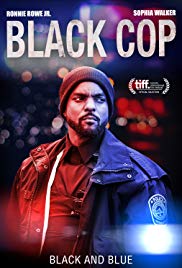
BLACK COP
Canada, 2018, 91 minutes, Colour.
Ronnie Rowe.
Directed by Corey Bowles.
As the title indicates, this is a film about a police officer, a police officer who is black. However, it is by no means a run-of-the-mill police investigation story. It was written and directed by Corey Bowles, based on a short, 11 minute film of the same title he had made some years before.
The film is working significantly on two levels. On the one hand, there is the visual style of the film, a great number of close-ups on the policeman, on his face, relying on expressions, mainly impassive, some full of anger. More of the film takes place in the dark than in sunlight. There is also the device of the voice-over of the policeman, telling the story of his relationship with his father, ultimately revealing that he is a policeman, the demands of his father, the son’s admiration for him. But, there is a great deal of explanation about the policeman, his character, his experiences and attitudes. There are quite a number of songs in the background with significant lyrics. And, the screen goes dark quite a number of times to let the audience have time to reflect on what they have seen, how they are responding, before the action resumes.
Ronnie Rowe is a strong presence as the Black Cop. The action takes place over a short time, the audience getting to know the cop and his personality, something of a loner while still working with officers at the precinct, experiencing some racial taunting, trying to give advice to the young woman who is spending her first days in the office.
As regards narrative, we see the cop in action, initially with a teenager whose bike has been stolen – and he gives the impression that he might be lying but, in fact, he is not and, ultimately the cop returns his bicycle to him after it has been run over. There are quite a number of ominous people present, looking at the policeman, giving him the finger, talking about him – and these are mainly black.
The film focuses on the key incident where the cop is walking home, hooded, listening to music, accosted by two white policeman who seem to assume that there is something criminal about him. He defies their interrogation – they have guns, he does not explain who he is until there are many tense moments and they finally cuff him, then discovering the truth. The point is made about how black men find it difficult to walk down the street, are assumed to be dangerous or criminal by the white officials.
This episode has an effect on the cop that he then turns his anger (we see him also with energy outlets in some fierce gym exercise and boxing) on white people, treating them as white cops treated him. He goes to the rescue of two young black men who are being accosted by a violent white policeman, letting them go, attacking the policeman and taking his uniform and disposing of him in the garbage bin. He accosts a jogger who turns out to be a doctor, who is puzzled by being held up, is treated violently and then let go. There is also a couple in a car, she defiant when the car is stopped, the cop violent towards her male passenger, and treating her roughly with the interrogation, giving them a ticket and demanding that they go to the police station. He also accosts a young white man on a path, the man frightened, eventually weeping, let go and running away.
The young rookie at the police station is suspicious of him, interrogates him and he gives some justification of his stances.
A film that is different in terms of police work, and a strong critique of racial profiling.
1. The title, expectations? The film different from what is expected? The screen presence of Ronnie Rowe?
2. A Canadian film, American racial settings, the town, the streets, homes, the highways? Police precincts? The gym? The musical score – the range of songs and lyrics played throughout the film and in the cop’s car?
3. The visual style, the close-ups, the darkened shadows, the fierce gym boxing episodes, the cop at home, the screen going black, time for the audiences to reflect, the voice-over and explanations? The editing and pace? Real with the touch of the surreal?
4. The cop, explanation of himself, as a policeman, the impact of his father, the revelation his father was police? A loner? At the station, looking at the man waiting in the street, the flippant attitudes of the white policeman, the young black rookie and her first day – and her later accosting him with the gun?
5. His experience with the white police, their suspicions, their rough treatment, menace? His not answering them? Cuffing him? The revelation of the truth? Their still blaming him? Audience tension on his behalf?
6. The impact, his treating white people in the same way, the jogger, rough treatment, explanation that he was a doctor, violence, letting him go? The two young black men accosted by the white policeman, his attack, letting them go, taking the uniform, dumping him in a bin? The couple in the car, his treatment, violent towards the man, rough with the woman, their sitting on the ground, the ticket? The young man on the path, suddenly stopped, puzzled, fearful, weeping, running away?
7. The impact for the Black Cop, racial profiling, his becoming victim? His victimising of the whites? The conclusions for the film audience about such profiling, the behaviour of police?